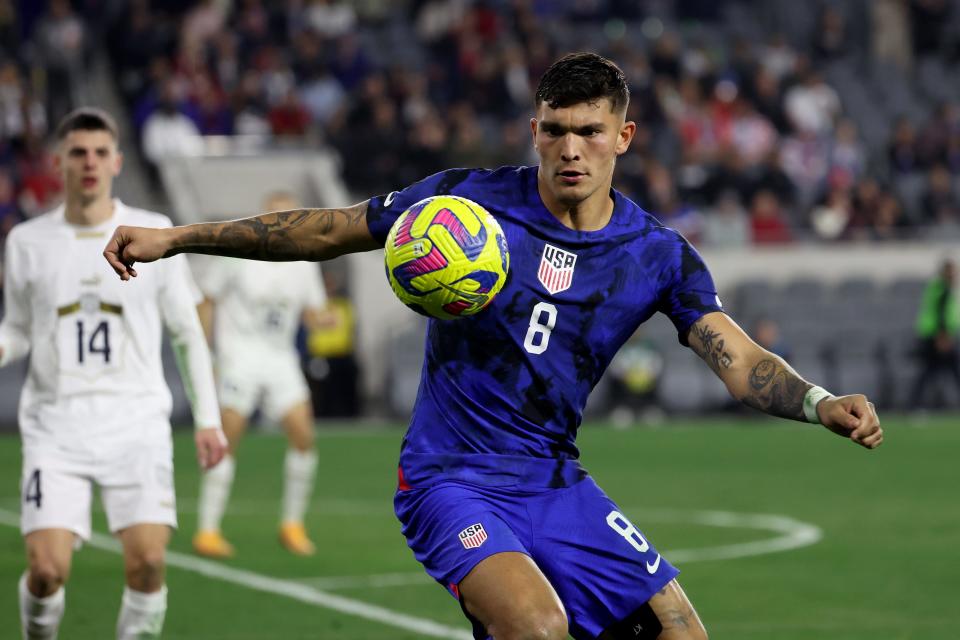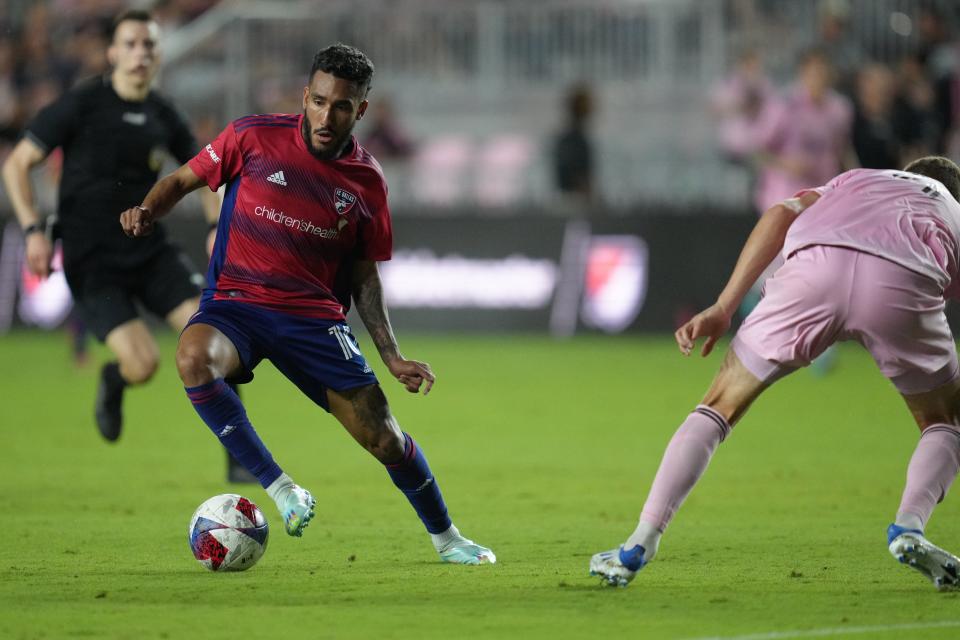Dual nationals unite, face each other in US-Mexico soccer match at State Farm Stadium
- Oops!Something went wrong.Please try again later.
Brandon Vazquez had a decision to make, one not made lightly given his family's strong connection to Mexico, his hometown of Chula Vista, Calif., being so close to the international border and his youth club soccer days spent with Club Tijuana just a few miles from where he grew up.
Mexico was and remains a big part of who Vazquez is. But there was no ignoring the time spent with U.S. youth national teams at various competitions, Vazquez's years in Major League Soccer with Atlanta United and now, FC Cincinnati.
Discussions with family and representatives, plus some input from others eligible to play for both Mexico and the U.S., and the lack of interest from the Mexican Soccer Federation in inviting him to its national team helped Vazquez ultimately choose the red, white and blue. And the forward is set to make his third appearance with the U.S. men's national team Wednesday night. Against Mexico, no less.

The North American soccer rivals go head-to-head at State Farm Stadium in front of an expected crowd of about 53,000. Even without the bigger-name players based in Europe. With mostly players from Liga MX, Mexico's top domestic league, and MLS, the top pro league in the United States. And on a Wednesday night.
The rivalry is real and the passion is intense. The way it has been for decades now that the U.S. has become a more competitive soccer nation.
"This game coming up is huge, especially, of course, for me. Coming up in a Mexican household watching the Mexican national team play every time there was a game, getting to play against them. Always the respect is there for them but at the same time, I want to step onto the field and beat whoever I'm playing," Vazquez said. "For me, the decision was where I feel I would fit best and where I think I would perform at my best. And for me, that's the United States. I grew up with a lot of the players around here, and I feel like my chemistry with the players around me fits best here. And I think I can perform at my best with this group."
That's music to the ears of U.S. interim head coach Anthony Hudson, who has a number of players on the U.S. roster for Wednesday's game that could have opted to play for Mexico or another country. Those include defender Sergiño Dest, born in The Netherlands to a Surinamese-American father, and forward Jesús Ferreira, born in Colombia but raised in the U.S. and now a citizen.
Like Vazquez, Dest and Ferreira could have chosen the national teams of those respective countries. But for Dest, it was U.S. Soccer's belief in him when the Dutch federation didn't, and for Ferreira, it was growing up in the Dallas-Fort Worth area and playing in the same academy of the MLS team for which his father David starred, FC Dallas.
Also like Vazquez and Dest, Ferreira said U.S. Soccer's frequent checking in on him showed the interest that appealed to him, while Colombia was not in the picture. Even when ineligible to play for the U.S., Ferreira said he'd still be invited to team camps, where he got to know future teammates and current MLS rivals.

Ferreira wanted badly to play for Colombia, he admitted. He wanted to follow in his father's footsteps and represent the country in which he was born. But the decision to play for the U.S. wasn't hard to make.
"It's that extra effort that the U.S. did to keep me involved. Even when I was getting called up to the U-20 camps, I was unable to play, but they would call me in just to be around in practice. And so those little details are the ones that kind of give you that extra point," Ferreira said. "You always want to go somewhere where you're wanted and they're going to look out for you. And so the U.S. did that for me. I had to do my citizenship test and all that before I could represent the U.S., but I was still getting called into camps. And I was still practicing."
U.S. Soccer doesn't always get the dual-national players it wants for the national team. But the growth of the sport, the young talent all over the country and the environment for players at national team youth levels have helped the federation land players with American heritage or citizenship and add them to a core of promising players who want to elevate the national team.
"Our philosophy and what I believe in is that we firstly, just engage with the player and just share who we are, how we do things, how we play, what the environment's like. We can get them in the environment to see the way we train and the way we operate," Hudson said. "I mean, it's a special environment, we've got a great group of players. So if we can get them in the environment then I think that's a bonus, you know, talk a little bit about how we see them fitting in the team going forward, in terms of a role, in terms of opportunity. The opportunities, obviously, they're coming up for us, which is incredible. And World Cup (in 2026)."
Mexico has often competed with the U.S. for players, given the proximity of the two countries and the large Mexican population in the U.S., where young players have Mexican parents and are thus eligible to play for both countries.
More: New to jobs, U.S. and Mexico men's national team coaches understand big soccer rivalry
In their youth, players can represent one nation on select national teams before deciding to play for one country or the other at the senior level. The roster that Mexico brings to Glendale on Wednesday includes East Los Angeles native Efraín Alvarez and Lompoc, Calif., native Julian Araujo, who both chose Mexico over the U.S. team.
Mexico head coach Diego Cocca said his program isn't worried about any perceived notion that Mexican American players who have considered both teams or will do so in the future think of the U.S. team as being in a better position at present than that of Mexico.
"We just want our team to play well. We're happy for anyone wherever they choose to play. If we play well, then we'll see about the future," Cocca said in Spanish.
Hudson is set to guide the U.S. against Mexico on Wednesday, then in June in Las Vegas against Mexico in the Concacaf Nations League semifinals. Almost immediately after that, the Concacaf Gold Cup begins, and both countries will take part.
"I'll be certainly pinching myself. I mean, I've been involved with these games before but as an assistant," Hudson said. He and Cocca are new to their respective teams.
"This is different, you know, U.S., Mexico. I'm hearing the stadium's close to getting full. I hope that it's absolutely packed."
Gold Cup in Phoenix date set
The Gold Cup is coming to Glendale for the sixth time, and Mexico will play on June 29 at State Farm Stadium against Haiti in the second Group B match for both national teams. The game is slated for a 7 p.m. start with Honduras taking on Qatar at 4:45 p.m. in the opening match of the night.
Tickets will be on sale to the public at 10 a.m. on April 25 at GoldCup.org.
This article originally appeared on Arizona Republic: Why players chose US national soccer team over countries of birth, origin

